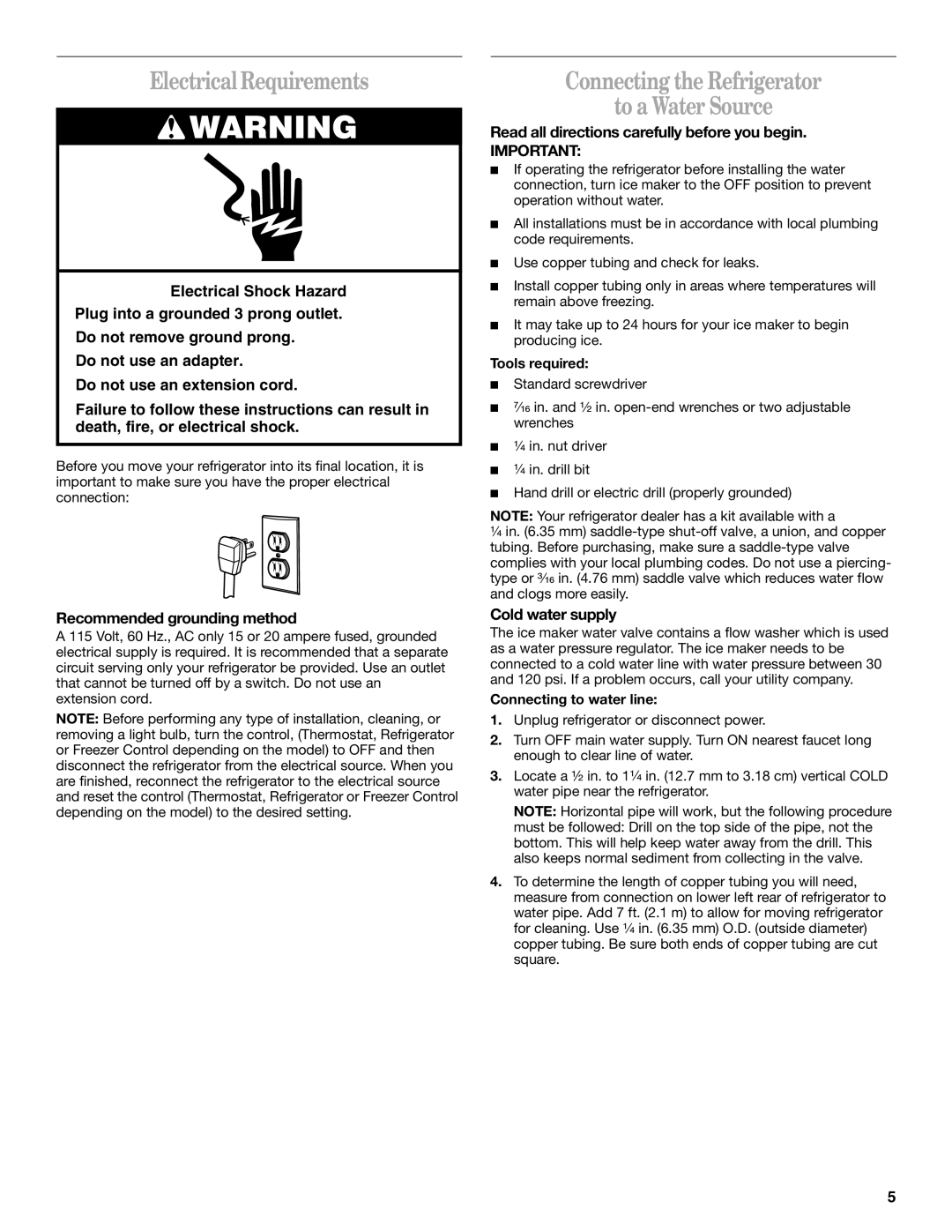
Electrical Requirements
![]() WARNING
WARNING
Electrical Shock Hazard
Plug into a grounded 3 prong outlet.
Do not remove ground prong.
Do not use an adapter.
Do not use an extension cord.
Failure to follow these instructions can result in death, fire, or electrical shock.
Before you move your refrigerator into its final location, it is important to make sure you have the proper electrical connection:
Recommended grounding method
A 115 Volt, 60 Hz., AC only 15 or 20 ampere fused, grounded electrical supply is required. It is recommended that a separate circuit serving only your refrigerator be provided. Use an outlet that cannot be turned off by a switch. Do not use an extension cord.
NOTE: Before performing any type of installation, cleaning, or removing a light bulb, turn the control, (Thermostat, Refrigerator or Freezer Control depending on the model) to OFF and then disconnect the refrigerator from the electrical source. When you are finished, reconnect the refrigerator to the electrical source and reset the control (Thermostat, Refrigerator or Freezer Control depending on the model) to the desired setting.
Connecting the Refrigerator
to a Water Source
Read all directions carefully before you begin.
IMPORTANT:
■If operating the refrigerator before installing the water connection, turn ice maker to the OFF position to prevent operation without water.
■All installations must be in accordance with local plumbing code requirements.
■Use copper tubing and check for leaks.
■Install copper tubing only in areas where temperatures will remain above freezing.
■It may take up to 24 hours for your ice maker to begin producing ice.
Tools required:
■Standard screwdriver
■⁷⁄₁₆ in. and ¹⁄₂ in.
■¹⁄₄ in. nut driver
■¹⁄₄ in. drill bit
■Hand drill or electric drill (properly grounded)
NOTE: Your refrigerator dealer has a kit available with a
¹⁄₄ in. (6.35 mm)
Cold water supply
The ice maker water valve contains a flow washer which is used as a water pressure regulator. The ice maker needs to be connected to a cold water line with water pressure between 30 and 120 psi. If a problem occurs, call your utility company.
Connecting to water line:
1.Unplug refrigerator or disconnect power.
2.Turn OFF main water supply. Turn ON nearest faucet long enough to clear line of water.
3.Locate a ½ in. to 1¹⁄₄ in. (12.7 mm to 3.18 cm) vertical COLD water pipe near the refrigerator.
NOTE: Horizontal pipe will work, but the following procedure
must be followed: Drill on the top side of the pipe, not the bottom. This will help keep water away from the drill. This also keeps normal sediment from collecting in the valve.
4.To determine the length of copper tubing you will need, measure from connection on lower left rear of refrigerator to water pipe. Add 7 ft. (2.1 m) to allow for moving refrigerator for cleaning. Use ¹⁄₄ in. (6.35 mm) O.D. (outside diameter) copper tubing. Be sure both ends of copper tubing are cut square.
5
